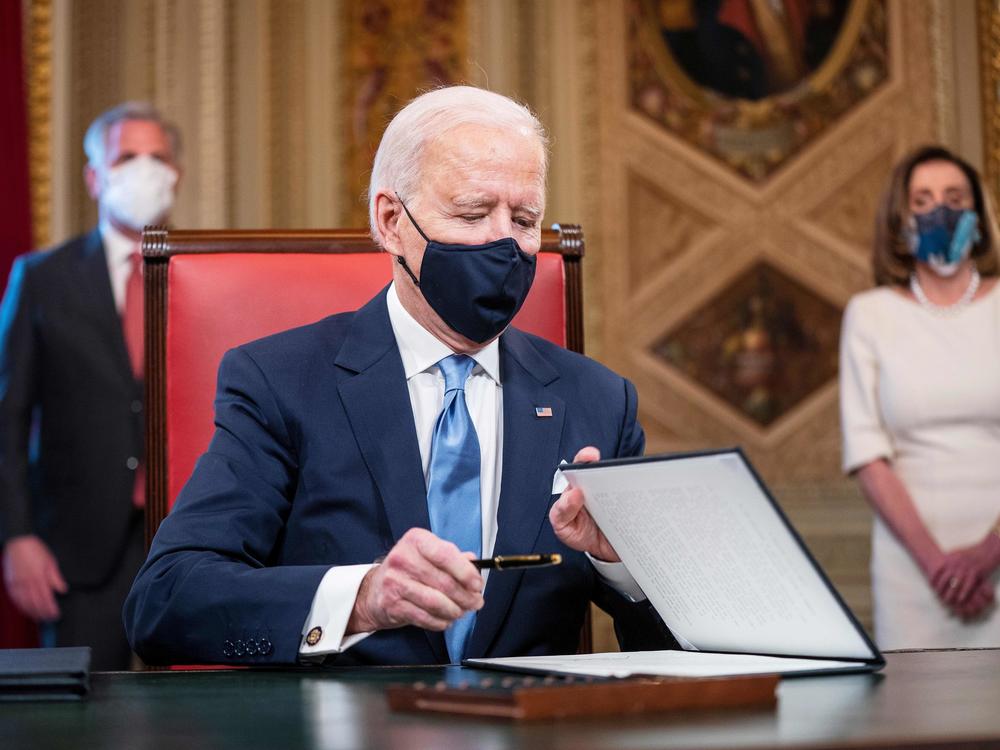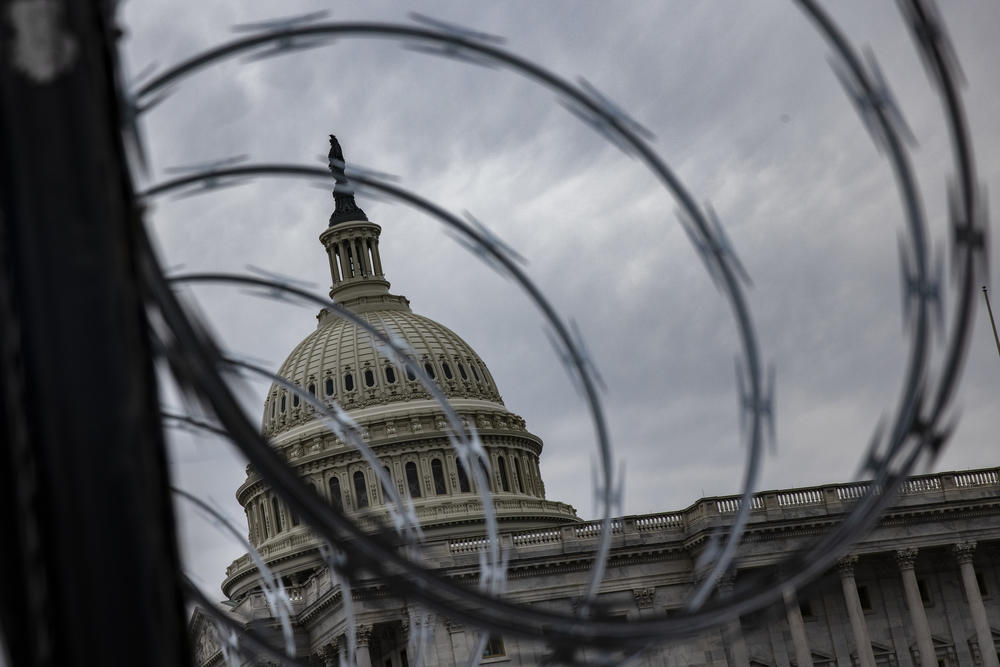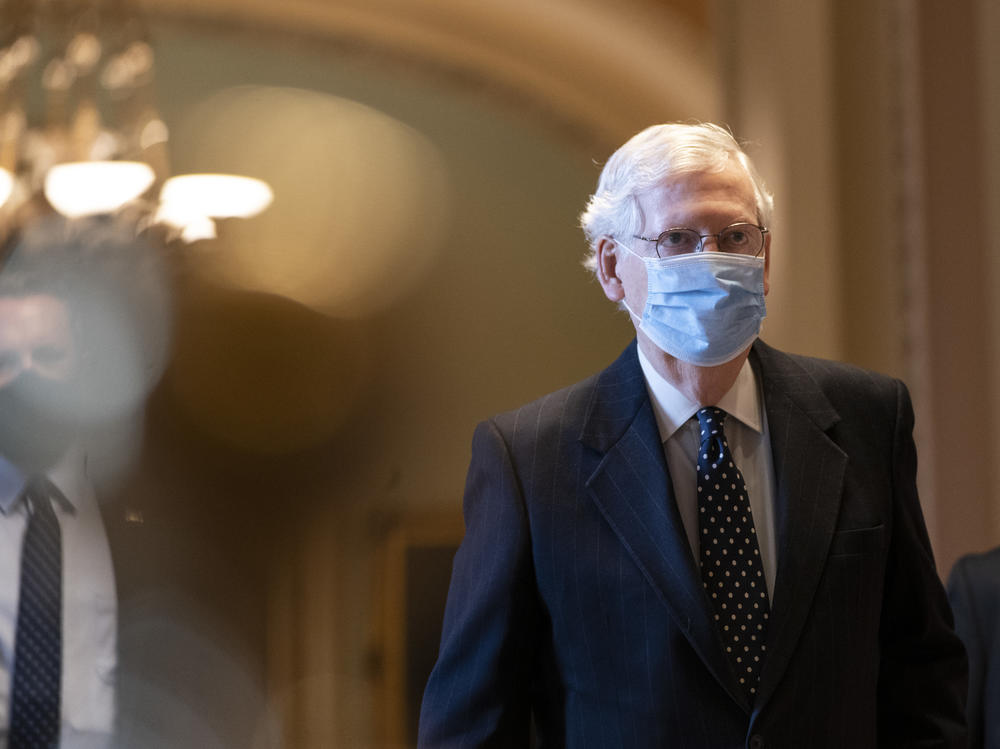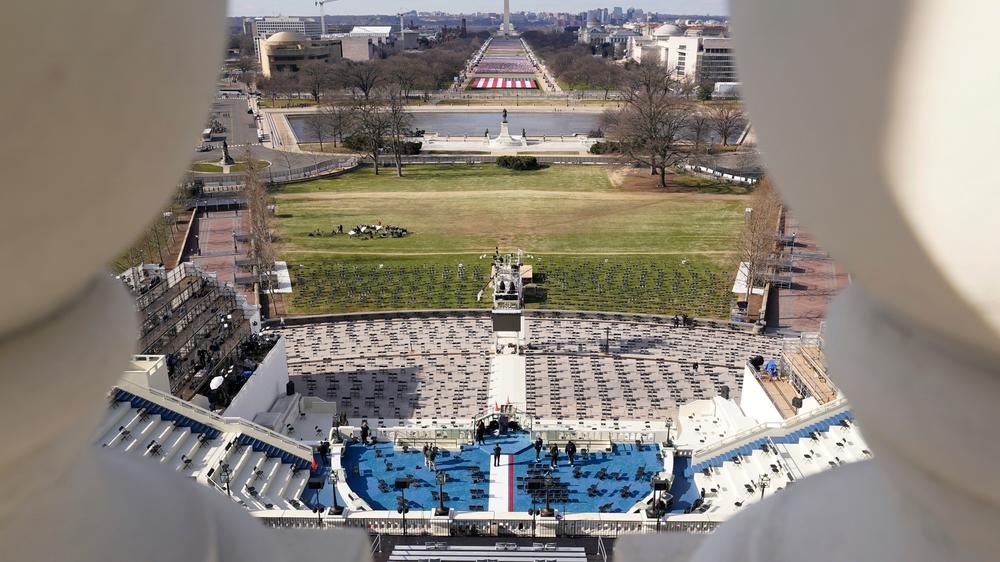Section Branding
Header Content
Biden Called For Unity In His Inaugural Address. He Might Find It Hard To Come By
Primary Content
Updated 5:01 p.m. ET
If you haven't heard, Joe Biden would like to unite America.
It was a focus of the Democrat's campaign. It's even the theme of Biden's inauguration — "America United."
He made lots of appeals to unity in his inaugural address.
"We can join forces, stop the shouting and lower the temperature. For without unity there is no peace, only bitterness and fury. No progress, only exhausting outrage. No nation, only a state of chaos. This is our historic moment of crisis and challenge, and unity is the path forward."
But even he knows it won't be so easy.
"I know speaking of unity can sound to some like a foolish fantasy these days," Biden said. "I know the forces that divide us are deep and they are real. But I also know they are not new. Our history has been a constant struggle between the American ideal that we all are created equal and the harsh, ugly reality that racism, nativism, fear, demonization have long torn us apart."
The country is as divided as it's ever been, as pessimistic as it's been in three decades and facing health, economic and racial crises.
American division did not begin with Donald Trump and won't end with him leaving the White House.
A very different inauguration
Biden's inauguration as the 46th president was different than any seen before in U.S. history. Four years ago, Trump was arguing over his crowd size compared with Barack Obama's record-setting turnout of supporters on the National Mall.
This time, because of the coronavirus pandemic and security concerns, the Mall is shut down — as is much of downtown Washington, D.C.
After the violent insurrection at the U.S. Capitol on Jan. 6 by a mob of pro-Trump supporters, the entire Capitol complex, a place that is generally open to the public, has been locked down.
There is now 7-foot high, "non-scalable" steel fencing topped with razor wire surrounding the Capitol.
With threats looming, armed troops are stationed every few feet. Some 25,000 troops were in Washington Wednesday to fortify the inauguration.
It's like a scene from a war zone in another country. But in fact that's more troops than the U.S. currently has deployed in Afghanistan, Iraq, Syria and all of Africa combined.
Biden tried to show a semblance of normalcy, walking out of the presidential limo to the White House, but it was heavily curtailed. There were some people along the walk, but not the throngs of crowds lining the streets from past inaugurations.
Setting a new tone, but deep fissures remain
Getting through Wednesday is the first part. Biden's speech was a 180-degree turn from Trump's "American carnage" address four years ago.
It stressed unity, and set a tone of decency, but there was a glaring, yet invisible sign of just how difficult true unity will be.
In a fit of protest, Trump did not attend. Former Vice President Mike Pence was there instead and did not attend Trump's farewell at Joint Base Andrews.
It was the first time in 150 years that a sitting president did not attend the inauguration of his successor.
The Trumps have cast aside other traditional signs of the peaceful transfer of power. When Biden's daughter Ashley was asked Tuesday on NBC's Today by Jenna Bush Hager, the daughter of a former Republican president, whether soon-to-be first lady Jill Biden had heard from Melania Trump, she said, "No, I don't think they're doing the traditional protocol, which is unfortunate, but I think we're all OK with it."
President Trump convinced tens of millions of his followers of false claims about a stolen election and widespread fraud, none of which is true. Key members of his own administration called it the most secure election in history.
Much of the mob that stormed the Capitol echoed Trump's talking points, which were only amplified by conservative media in the runup to the Jan. 6 violence.
The misinformation consumed by many on the right has been fed for decades through prime-time cable dressed up as straight news. Facebook memes and outfits even further on the fringe than Fox News are growing in popularity. Conspiracies are being mainstreamed.
There is no good answer for unraveling that. So the country will remain sharply divided.
Trump leaves office with a 38% approval rating in the latest NPR/PBS NewsHour/Marist poll, and Biden gets more positive reviews than Trump so far. A majority approve of how he handled the transition, think he'll do more to unify than divide and more people like him than don't, but not by much.
But strikingly, 8 in 10 Republicans approve of the job Trump was doing, and 7 in 10 of them don't accept the results of the presidential election.
So Republicans have little political incentive to work with Biden.
And Biden has an ambitious agenda — a $1.9 trillion COVID-19 relief plan, requiring a $15 federal minimum wage, an immigration overhaul addressing the millions of immigrants in the U.S. illegally, not to mention trying to lead a dialogue on race in America.
As with all presidents, Biden doesn't have a magic wand. He can't heal families torn apart by views of Trump in one swoop. And he certainly can't get his agenda implemented without the help of Congress.
The president, after all, controls the sword, but the Congress controls the purse. And Biden is going to need an awful lot of what's in that bag.
While Democrats will control both the House and Senate, it will only be just narrowly. The Senate will be tied 50-50. On tied votes, soon-to-be Vice President Kamala Harris will break them.
Republican Senate leader Mitch McConnell in recent days has spoken out against Trump and laid blame at his feet for the violence at the U.S. Capitol on Jan. 6.
"The mob was fed lies," McConnell said on the Senate floor Tuesday. "They were provoked by the president and other powerful people, and they tried to use fear and violence to stop a specific proceeding of the first branch of the federal government which they did not like."
McConnell showed all the perfunctory signs of a degree of unity. He attended Mass with Biden Wednesday morning. He was present at Biden's inauguration and was cracking wise at the Capitol in congratulating Biden and Vice President Harris, the first woman, African American and person of Indian descent to be vice president.
"Not only did we swear in a former son and daughter of the Senate as the president and vice president, but both these former senators skipped the House altogether," McConnell joked with House Speaker Nancy Pelosi present.
Senators, of course, are the subject of the joke that each of them wakes up in the morning and looks in the mirror they see a president.
But for most big legislative items the new president wants, it will require 60 votes from those senators to overcome a filibuster. And McConnell used the filibuster more than any minority leader in history during the Obama years.
Will he really be turning over a new leaf of bipartisan camaraderie and goodwill?
McConnell is undoubtedly eyeing taking back the Senate in two or more years, and he will need the support of his Republican members to be majority leader again.
What's more, Republicans, who turned a blind eye to Trump's deficit spending and ballooning of the debt, are already becoming fiscal hawks once again.
"What I'm concerned about is we seem to have no concern now about borrowing money in the short term," Sen. John Thune, R-S.D., said Tuesday during the confirmation hearing for Janet Yellen to be Treasury secretary.
He went on to lay out the traditional Republican argument about how the parties aim to balance the budget — Republicans want to cut spending, while Democrats seek more revenue, which means increasing taxes.
But that didn't apply to Trump. The national debt increased by $8 trillion under the outgoing president to almost $28 trillion. Trump's tax cuts alone cost $2.3 trillion.
But it's not just money, it's also familiar cultural fights. Sen. Josh Hawley, R-Mo., who has faced criticism for his role in objecting to Biden's win ahead of the violence at the Capitol, said Tuesday that he was putting a hold on Biden's choice to lead the Department of Homeland Security, Alejandro Mayorkas.
"Mr. Mayorkas has not adequately explained how he will enforce federal law and secure the southern border given President-elect Biden's promise to roll back major enforcement and security measures," Hawley said, going on to cite Trump's border wall.
And all of this is to say nothing of the pressures Biden is facing from the progressive left, which wanted nothing more than to beat Trump. Now that they have, progressives are eager to make sweeping change. But the numbers in Congress aren't there.
If Biden, progressives and even many Republicans on Capitol Hill were looking to move on from Trump, it's going to take a little while. That's because much of what Biden wants to do — whether it's dealing with COVID-19 or just confirming Cabinet secretaries — is going to have to share time with Trump's impeachment trial.
The House is expected to send the article of impeachment to the Senate soon, and when it does, the Senate has to take it up immediately. And there is only so much time in the day.
Biden is aiming to at least bring down the temperature and bring back a degree of traditional Washington comity. That was evident not just in his inaugural address, but Tuesday night in the somber ceremony in front of the Lincoln Memorial Reflecting Pool, remembering the 400,000 Americans who have died from COVID-19.
It's notable that this was the first time in this year of the coronavirus that there was a national moment focused on remembering the dead, as many Americans couldn't even be with loved ones who died in hospitals across the country and never had proper funerals.
The congressional leaders are aiming to continue the show of staidness Wednesday morning, with all planning to attend Mass with Biden ahead of his inauguration.
But soon it will be back to partisan bickering, and it's going to take one hell of a prayer to get everyone to work together in earnest and unite the country.
Copyright 2021 NPR. To see more, visit https://www.npr.org.




